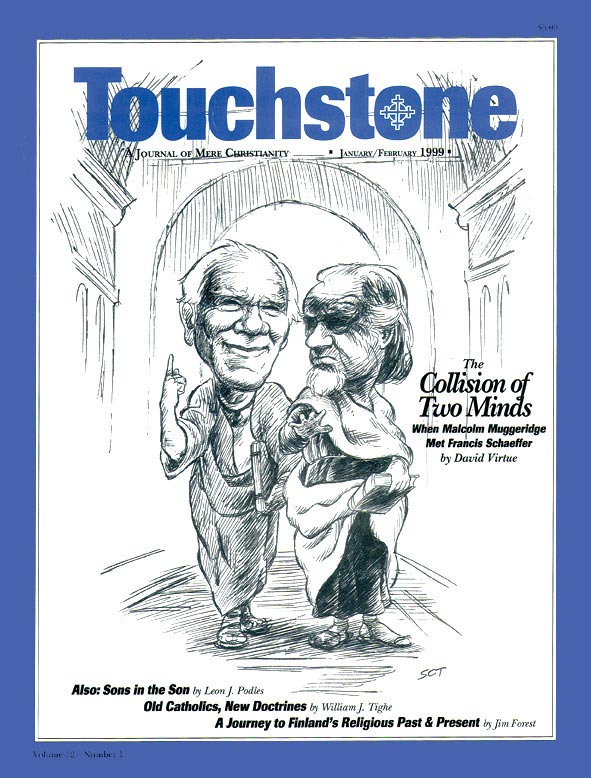Real Virtue for Early Adolescents
Raymond J. Brown on Raising Children
Several years ago my daughter Emily and I watched some old reel-to-reel swashbucklers starring Errol Flynn and Olivia de Haviland and featuring the stirring music of Erich Korngold. Not long after, Emily told me that she had become acutely aware that the books and movies for which she preferred to allocate time, money, and mental energy were at odds with the literary and cinematic fare of her peers. This was a gift. There was considerably more to her convictions than just avoidance of unseemly amusement. Not merely eschewing the many bad media influences that parents worry so much about, my daughter had espied that the artistic muses, thematic choices, and presentational earthiness of today are often not real at all.
To Emily, now a sophomore in high school, much entertainment today is spoiled from the root, being based on false assumptions about reality. There is a tendency to assume that today’s artistic portrayals, both on the page and on the screen, however flawed by commercial appeals to baser instincts and immodesty, are still usually more realistic than earlier fare. I have heard many vulgar and morbid books and screenplays described as “real life.”
To Emily, however, contemporary movies do not reflect reality, unlike the written and spoken and acted stories of an earlier time. While the older entertainment may have lacked “realistic” dialogue, sexual explicitness, mature themes, and special effects, contemporary entertainment lacks simple appeals to what may be latently noble in its consumers. She spoke wistfully about the goodness and nobility that is absent from much contemporary entertainment.
How did Emily come by this instinct? My wife and I have always read to our three children. Not too long ago I asked Emily what her three favorite books of our bedtime reading had been over the years past. Emily’s choices were Jane Porter’s The Scottish Chiefs, Lewis DeWohl’s Citadel of God, and Emmuska Orczy’s The Scarlet Pimpernel. The Scottish Chiefs, written in 1831, is the epic story of Sir William Wallace (Mel Gibson’s “Braveheart”) and the Highland clans’ thirteenth-century struggle for freedom. Citadel of God, published in 1957, relates the saga of a monk named Benedict who stood against both the decaying ways of sixth-century Rome and the invading barbarians—and prevailed. The Scarlet Pimpernel, released at the turn of the last century, tells the tale of an ingenious and picaresque band of young English gentlemen, as well as a beautiful French lady, who risk their lives to save innocents from the guillotine during the French Revolution.
These are all rollicking good yarns, but there was more than that that made these stories my daughter’s favorites. From selfless love of country in medieval Scottish moors, to the endurance of the divine in ancient Rome, to noblesse oblige during the Reign of Terror, these three very different works shared certain underlying and consequential assumptions. I can best explain this by contrasting them with the outlooks commonly assumed in the written and audio-visual entertainment that prevails today:
• Character flaw was not a problem with a political solution.
• Shame was a legitimate consequence of wrongful acts.
• Life was serious, but not wholly utilitarian.
• The clergy were not only present but also occasionally brave and relevant.
• Personal convenience was not a common idolatry.
• Heroes and heroines were concerned with moral duty, not personal feelings.
• Popular opinion was not considered sovereign. Often quite the opposite was the case.
• Young adults, however physically healthy, seem to have had little in common with promiscuous rabbits.
• Death was not the worst thing.
• Virginity was not an abnormal state.
• Self-esteem was not explicitly mentioned at all (implicitly, it tended to be a collateral result of grace rightly accepted and acted upon).
• There was hope and there was fear—there was not psychoanalysis.
• Courtesy was not remarkable. Its absence was remarkable.
• Self-sacrifice was held to be a higher endeavor than self-fulfillment.
• The prevalent ideal was one life, one wife.
• Sexual acts were no less beautiful or powerful for being private—and subordinate to honor and duty.
• Though people might well fall short of righteousness, indeed might conceal their sins, no one dared deny that objective right existed.
• Morality was not a matter of personal preference.
• “What I need” or “what I get out of it” was a sentiment never portrayed in a favorable manner (and one may note, sadly, that many Christians today approach their spiritual and ecclesiastical endeavors, unashamedly, with precisely that outlook).
• Concern for responsibilities was at least as important as concern for rights.
• There were underlying assumptions that the proverbial “real world” might not be as real as is today commonly supposed. There was something and Someone wholly other, and wholly real.
• Though their passing may be little lamented and much residual blame may be associated with their once high status, the code of chivalry and the code of the gentleman did not countenance the harassment of women.
• Manhood was a status to be earned by accomplishment, not assumed with age.
• Tolerance and patience, taken to absolute extremes, became either moral imbecility or cowardice.
As a confessing Christian, I am hard-pressed to regard the theses and antitheses as anything other than true and false, for all time. How different from the code of most modern entertainment, in whole or part, were the books my daughter most wanted me to read to her! I do not think that Judy Blume would approve the contrasts listed above and the manner in which I have listed them. Nor would many others who write today, for whom reality is most closely approached when the result of indulging in fantasy living comes to issue.
Even today where virtue is not entirely forsaken in either the assumptions or the intended message of a story, the tendency is to concentrate upon what Natalia Ginzburg calls “the little virtues.” That is, shrewdness is more promoted than courage, thrift more than generosity, intellect rather than goodness, virtuosity instead of altruism.
Conversely, all three authors of Emily’s favorite post-compline books would be found guilty of the charge of promoting an unqualified idealism. But idealism is not, as is commonly supposed, akin to a dearth of realism; even less is it a denial of truth. To so opine “betrays the kind of blinkered mind which cannot appreciate that a Norman Rockwell idealization is not necessarily false for being ideal, or for failing to satisfy a revisionist’s misconception of the truth.”1
My daughter’s insight taught me that the best of the traditional Western worldview has a strength of attraction much more real than I might have supposed. Emily and I still speak of the characters in the works listed above as though we knew them personally. Emily found herself in stories that were ennobling. They were places in which she liked to be and to which she would return. And it is not just because the tales were adventurous and exciting. Still less is it because they were “nice.” Emily liked being in the stories because the attendant and usually implicit beliefs and messages therein were true. She had gathered that on her own and could contrast their outlook with the deluge of trendy communications baptizing many of her contemporaries. I suppose I ought never to have underrated the power of what I have heard sarcastically described on a certain television sitcom as “eternal verities” in any endeavor with my children—or with anybody else.
In the not-too-distant past, I had to attend one of those professional social hours to which one is occasionally subjected. As the glasses clinked and everyone seemed to say, “I really shouldn’t,” as hors d’oeuvres were offered, two of my peers and I spoke of our families. When my colleagues spoke about some of their teenage children’s choices, my distressed thoughts must have communicated themselves. So there was a polite rejoinder to my countenance: “Hey, this is the ’90s. You gotta face it. This is reality.” I do not believe it. Not at all.
Note:
1. Fraser, George MacDonald, Quartered Safe Out Here (London: Harvill, 1992), p. xviii. MacDonald Fraser wrote eloquently in his recollection of the 1945 campaign in Burma—widely acknowledged as one of the great memoirs of the Second World War—what most combat veterans of that war know. That is, that all the very real brutality and insanity in this world does not negate the honor and selfless sacrifice that is also abroad and about. “As for stupidity and sadism: yes, this soldier saw plenty of the one and a little of the second, but never knew them to be represented as . . . noble courage.” He saw plenty of that last, too, and wrote unashamedly and realistically about it.
Raymond J. Brown is a captain in the United States Coast Guard and the author of numerous articles on maritime and intelligence matters. A Lutheran, he teaches confirmation classes and is on the Board of Directors of the American Lutheran Publicity Bureau. He and his wife and three children live in New Hampshire.
Raymond J. Brown is Secretary of the American Lutheran Publicity Bureau, a retired U.S. Coast Guard captain, and a security consultant living in New Hampshire. He and his wife Susan, a librarian, have three grown children.
subscription options
Order
Print/Online Subscription

Get six issues (one year) of Touchstone PLUS full online access including pdf downloads for only $39.95. That's only $3.34 per month!
Order
Online Only
Subscription

Get a one-year full-access subscription to the Touchstone online archives for only $19.95. That's only $1.66 per month!
bulk subscriptions
Order Touchstone subscriptions in bulk and save $10 per sub! Each subscription includes 6 issues of Touchstone plus full online access to touchstonemag.com—including archives, videos, and pdf downloads of recent issues for only $29.95 each! Great for churches or study groups.
Transactions will be processed on a secure server.
more from the online archives
calling all readers
Please Donate
"There are magazines worth reading but few worth saving . . . Touchstone is just such a magazine."
—Alice von Hildebrand
"Here we do not concede one square millimeter of territory to falsehood, folly, contemporary sentimentality, or fashion. We speak the truth, and let God be our judge. . . . Touchstone is the one committedly Christian conservative journal."
—Anthony Esolen, Touchstone senior editor









